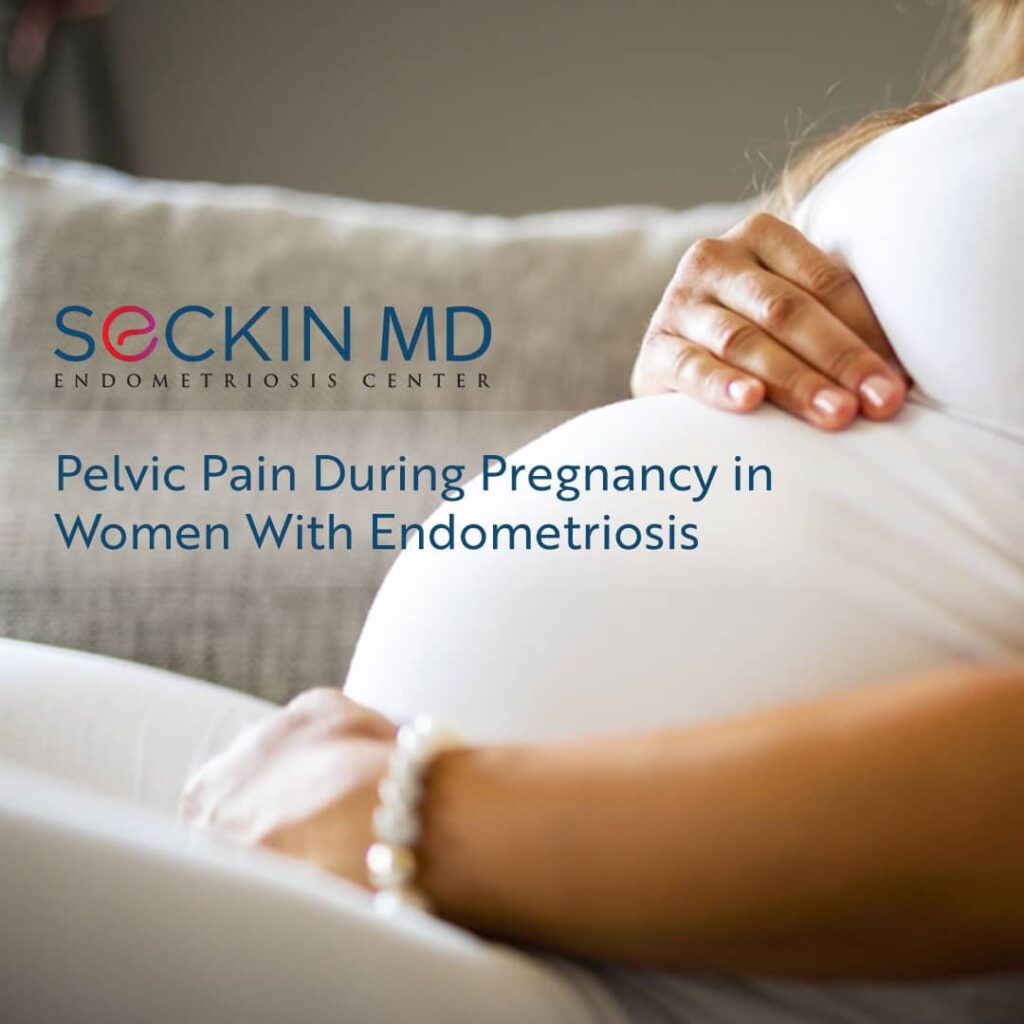Pelvic Pain During Pregnancy in Women With Endometriosis

Pelvic pain is one of the most common symptoms of endometriosis. Women with endometriosis may experience painful periods, severe cramping, chronic pelvic pain (pain even outside of periods), pain while passing gas, urine, or stool, and pain during sex.
The cause of pain in endometriosis is unclear. In endometriosis, tissue resembling the lining of the uterus grows elsewhere in the body, forming lesions. These lesions most frequently occur in the pelvis, but in some cases can also develop on the appendix, bowels, and even the diaphragm.
Researchers think that the swelling and breakdown of the misplaced endometrial tissue in response to hormones may cause the pain. Think of it as a micro-period, possibly in multiple different locations. Since the body cannot expel the endometriosis lesions, they may cause inflammation and pain. The lesions may also form nodules on the surface of pelvic organs over time causing even further pain.
Some endometrial lesions may develop a nerve within them. Or they may form near a nerve, pressing against it, thereby also causing pain.
What may cause pelvic pain during pregnancy?
The most common causes of pelvic pain during pregnancy include uterine muscle stretching due to fetus growth spurts, inflammation, the movement of pelvic joints during and after pregnancy, pressure from the fetus’ increasing weight, and the secretion of the relaxin hormone that helps in the softening of the ligaments and loosening of the joints for delivery.
In some cases, pregnancy complications can also cause pelvic pain. These include ectopic pregnancy (when the fetus develops outside the uterus), preterm labor (onset of contractions and labor before 37 weeks of gestation), miscarriage (loss of pregnancy), or placental abruption (placental detachment from the uterine wall). Endometriosis may increase the risk of these complications in some cases.
In women with endometriosis, the profile of experienced pain may change during pregnancy. While some women with the disease may get relief from pelvic pain, for others pregnancy may make the pain worse. Some women may see no change in their symptoms.
Why does the pain subside in some women?
In some women with endometriosis, pregnancy may provide temporary relief from pelvic pain, particularly during the later months. One reason may be the absence of the menstrual cycle and the monthly hormonal fluctuations.
Another reason may be the increased levels of the hormone progesterone during pregnancy. This progesterone may suppress the growth of endometrial tissue. Research has shown that progestin, a synthetic version of progesterone can, in fact, reduce pelvic pain due to endometriosis in approximately 90% of the patients. In fact, doctors sometimes prescribe progestin hormone therapy for women with the disease. This further supports the idea that high levels of progesterone may reduce pelvic pain during pregnancy in some women with endometriosis.
Pregnancy may provide temporary relief from pelvic pain in some cases. However, the symptom will often return after the birth of the baby when the monthly cycle resumes. Pregnancy should, therefore, not be a strategy to manage the symptoms of endometriosis.
Breastfeeding may delay the return of painful symptoms associated with having a period. This is because breastfeeding inhibits the release of the hormone estrogen by the ovaries. This suppresses both ovulation and the growth of endometrial tissues.
Why does the pain sometimes worsen during pregnancy?
Some women with endometriosis may not see any improvement. Some may even see their symptoms worsen during pregnancy, particularly during the earlier months. This may be because the uterus expands to accommodate the growing fetus. This expansion may pull and stretch the endometrial lesions and cause pain.
An increase in the level of estrogen may also worsen pelvic pain during pregnancy.
Pelvic pain due to complications in endometriosis
A Danish study found that pregnant women with endometriosis have a higher risk of complications such as pre-eclampsia and preterm birth. Both complications are associated with pelvic pain.
Another study suggests that endometriosis may slightly increase the risk of miscarriage, which is characterized by lower back pain, cramping, or bleeding.
Management of pelvic pain during pregnancy
It is crucial that women with endometriosis are closely followed during pregnancy to avoid complications and provide the necessary treatment if necessary.
Surgery and hormonal therapy (the standard treatments for endometriosis) cannot be implemented during pregnancy. Doctors may, however, prescribe pain relievers that are safe to use during pregnancy.
Other measures that may alleviate pelvic pain during pregnancy include taking warm baths, getting enough rest, and eating fiber-rich foods to avoid constipation. Prenatal stretching exercises, prenatal massage, avoiding sharp movements at the waist, and regular exercise may also help. Finally, heat pads, a pelvic support garment that provides support to the uterus, and wearing comfortable shoes with good support, can alleviate pelvic pain during pregnancy.
Get a Second Opinion
Our endometriosis specialists are dedicated to providing patients with expert care. Whether you have been diagnosed or are looking to find a doctor, they are ready to help.Our office is located on 872 Fifth Avenue New York, NY 10065.
You may call us at (646) 960-3080 or have your case reviewed by clicking here.